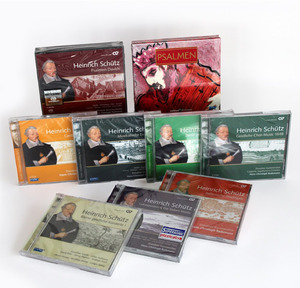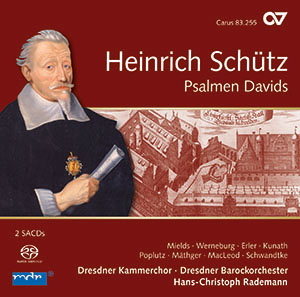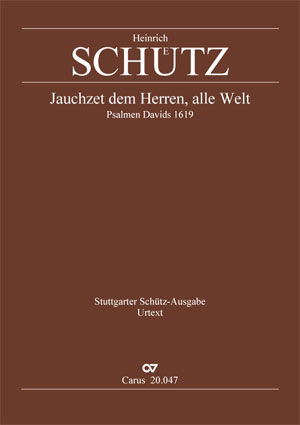
Danket dem Herren, denn er ist freundlich
from: Psalmen Davids II. Reconstruction SWV 45
With this magnificent setting of Psalm 136 from the Psalmen Davids of 1619, Heinrich Schütz broke new ground: he brought the court trumpet ensemble into the realm of art music (similar to Michael Praetorius at around the same time). Alongside the trumpet ensemble, a five-part ripieno choir ensures musical splendor, whilst the leading role is given two two favoriti choirs, one high (SSTT) and one low (TTBB, scored for tenor and three trombones). Schütz did not write out the trumpet ensemble parts, but made do with notating just the middle part, around which the other parts were to improvise. For this critical edition, the trumpet ensemble is available separately in a reconstruction by the internationally-famous baroque trumpet specialist Edward H. Tarr. This edition is also used for the recording of the Psalm with the Dresdner Kammerchor conducted by Hans-Christoph Rademann.
Purchase
Additional product information
-
Composer
Heinrich Schütz
| 1585-1672Heinrich Schütz is regarded as the first German musician of European stature. As a choirboy from 1599 at the court of Landgrave Moritz of Hessen-Kassel, he received a thorough education. In 1608 he began a law degree in Marburg, but broke this off in 1609 in order, with the support of the Landgrave, to study composition with Giovanni Gabrieli, organist at St Mark’s in Venice. In 1613 Schütz returned to Kassel, but two years later was enticed away by Elector Johann Georg I of Saxony to the Dresden court as “Organist und Director der Musica”, where he held the position of Hofkapellmeister (court Kapellmeister) from 1617 until his death. Schütz’s great cycles of vocal works marked the high point of his reputation in Germany and northern Europe. But these represent only part of Schütz’s output; individual works are represented in printed collections with works by other composers, others only survive in manuscript, and much has been lost. The Stuttgart Schütz Edition makes available Schütz’s complete oeuvre, and all works are also published in practical Urtext editions. Personal details
-
Editor
Uwe Wolf
| 1961Uwe Wolf studied musicology, history, and historical ancillary science at Tübingen and Göttingen. After receiving his doctorate in 1991 he was a research assistant at the Johann-Sebastian-Bach-Institut in Göttingen. From 2004 he worked at the Bach-Archiv Leipzig. There he directed a both research departments, was substantially responsible for the redisigning of the Bach Museum, and he developed the digital Online-Projekt Bach. Since October 2011 he has been the Chief Editor at Carus-Verlag, Stuttgart. He has taught at various universities and also belongs to the editorial boards of several complete editions. Personal details
-
Continuo realization
Paul Horn
| 1922-2016Paul Horn war ein deutscher Kirchenmusiker, Organist, Komponist und Musikwissenschaftler. Er studierte Kirchenmusik und Orgel an der Evangelischen Kirchenmusikschule Esslingen am Neckar bei Hans-Arnold Metzger und Musikwissenschaft, Theologie und Geschichte an der Universität Tübingen. Seine berufliche Laufbahn begann als Kantor an der Evangelischen Michaelskirche in Stuttgart-Degerloch. 1954 wurde er Kantor an der Evangelischen Stadtkirche Ravensburg, eine Position, die er bis zu seiner Pensionierung innehatte. Als Musikwissenschaftler arbeitete Horn bis ins hohe Alter eng mit Carus zusammen. So stammen zahlreiche Carus-Klavierauszüge aus seiner Feder. Personal details
-
Arranger
Edward H. Tarr
| 1936-2020
Reviews
2004500
Die Vertonung des 136. Psalms Danket dem Herren, denn er ist freundlich SWV 45 ist eine der umfangreichsten und zugleich die prachtvollste Komposition innerhalb der Psalmen Davids.
Toccata 01/02/2016
Frequent questions about this work
 There are no questions and answers available so far or you were unable to find an answer to your specific question about this work? Then click here and send your specific questions to our Customer Services!
There are no questions and answers available so far or you were unable to find an answer to your specific question about this work? Then click here and send your specific questions to our Customer Services!








